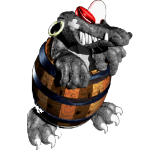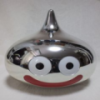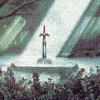Will this have 'levels' or be more like Metroid, and focus on exploring/ finding upgrades to advance? Do you have a lot of ideas for designs, or are you just kind of winging it as the project goes along? End Question time. 
Well, the general idea is that this game is to Blaster Master what Zodiac was to the Guardian Legend. So, yeah, a metroidvania style exploration system where you go in and out of your tank. I have the item and equipment set planned, different areas planned out in general terms, and the high points of the plot worked out. The soldier gets items that give him more mobility, and will get items that mimic some classic NES-era power ups, like Scrooge's cane, the Bubble from Bubble Bobble, the Grappling Hook, and that kind of thing. The Tank gets construction equipment -- excavator, bulldozer, etc -- and upgrades by manipulating its environment. Everything will evolve as I go, of course.
The whole concept is to explore the idea of "Scale." The soldier operates on a smaller scale than the Tank does, and eventually I want to get the screen size to change fluidly (right now it's just close-up on soldier or far-back on Tank) to allow the scale to change as a dramatic tool. Like, when you find an ancient ruin or large boss, the camera can pan back to show you the size. The plot mixes in this scale idea, too. The backdrop is a universe where no sentient life evolved anywhere except for Earth, but where a few million years after space faring began, Earth colonists have all evolved in different directions. And, time dilation is a real thing. So, space-faring are not surprised to find alien life, but just assume it came from Earth at some point. Settled people may not view it that way, as they have time to evolve, change, develop new culture, forget the past, etc during the thousands of years it takes ships to zip around space. The spacefarers see the big picture, the settled people see it more narrowly. Then, the game will explore how the spacefarers, crashing on an alien world, have to confront another idea of scale as they learn more about their environment.
Another way I plan on adding "scale" as a tongue-in-cheek reference is in pitting the player against RPG-style tropes from the indigenous people on the planet and have them react as reasonable people with a GIANT TANK would in that situation. Evil warlock's army attacking? Well, I guess we just run them over with a tank and blow up the castle. I absolutely loathed how StarCraft (and many other games) devolve into SPACE MAGIC, and I want to make a point that things get better and more powerful with progress and time, not WORSE. Your massive ancient slumbering evil waking up to destroy the world? Uh, technology has moved on since you were hot, Ancient Evil. Nowadays anyone with a functioning trigger finger can shoot plasma. No big deal.
Of course, step one is get all the fundamentals in place. So for a few months more, at least, I'll be taking the advice of people smarter than me on organizing my code as I build it out to cover all the core functionality of the game. Once I get that working, building the actual world is really not much harder than doing it using ZScript in Zelda Classic. When I added a new projectile type for the Soldier, for example, it was like a half hour job between drawing it, adding a new object, and connecting it up. There will be light at the end of the tunnel!
Are you doing this with a game engine like XNA or from scratch?
My ingredients started with:
Aseprite (for graphics creation)
Mappy (for map editing)
Visual Studio 2010 (for C++ coding and debugging)
Allegro 5.10 (for I/O functions)
Some-Library-That-Lets-Allegro-See-XBox-Controllers-Whose-Name-I-Cannot-Recall (for you know what)
Everything else is from scratch. It's a learning experience!
Edited by C-Dawg, 06 July 2016 - 10:50 AM.














